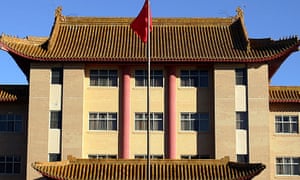Exclusive: Beijing ministers won’t speak to counterparts until Canberra discards ‘cold war mentality’, embassy says

Chinese government ministers won’t start answering phone calls from their Australian counterparts unless Canberra stops treating Beijing as a strategic threat, a senior embassy official has warned.
China is urging the Morrison government to make a clear decision on whether it sees Beijing as a “threat” or an “opportunity”, setting this up as a key precondition for resuming ministerial-level talks, which have been frozen since early this year.
In a sign there is no clear offramp from the serious diplomatic rift, a Chinese embassy official told Guardian Australia it was up to the Australian government to reflect on what it could do “to arrest the decline of the bilateral relationship” and create a better mood for talks.
“Of course you can say it takes two people to tango but here, you see, the problem is all caused by the Australian side,” said the official, who asked not to be named.
“The core issue is we think that the cold war mentality should be discarded in order to look at China as an opportunity not a threat. Otherwise the whole trajectory will be derailed.”
Scott Morrison and his ministers have repeatedly said the ball is in the Chinese government’s court regarding Australia’s push for “mature, sensible dialogue”, while insisting they won’t “trade away” values or sovereignty.
The trade minister, Simon Birmingham, has complained for months of being unable reach his direct counterpart to discuss actions targeting billions of dollars’ worth of Australian exports.
The freeze followed Australia’s call in April for an independent international inquiry into the origins and handling of Covid-19 – which the Chinese government interpreted as unfairly targeting it, but which Australia said was driven by the “unremarkable” desire to ensure that the world was prepared for the next pandemic.
Birmingham and the treasurer, Josh Frydenberg, reaffirmed this week that dialogue would be the best way to resolve any differences.
But China holds to the position that there would be no point in having ministerial or leader-level talks unless Australia takes some tangible steps to foster what it calls a better environment for dialogue.
“The problem is caused by the Australian side,” the Chinese embassy official said on Friday. “China is trying to send a message that Australia should change the mentality of how you look at China and its development and whether it’s an opportunity or a threat – that is the issue.”
In an apparent change in tactics over the past couple of weeks, Chinese officials – both in Beijing and Canberra – have become increasingly vocal in detailing their objections to the Australian government’s stance.
This week Nine News revealed that the Chinese embassy had handed it a list of 14 key areas of dispute, including Australia’s public commentary about human rights or territorial issues in Hong Kong, Taiwan and Xinjiang – matters the Chinese Communist party view as a “core interest” of particular sensitivity.
The list also included Australia’s Covid-19 inquiry call, a range of decisions about Chinese foreign investment proposals, and the 2018 move by the Turnbull government to block “high-risk” Chinese telcos including Huawei from the 5G network.
Nine News reported that the embassy’s list included “antagonistic” media reporting and “outrageous” comments by some MPs – prompting a furious pushback from Australian ministers, who said it was an unhelpful intervention and that the free press and politicians would not be muzzled.
The report included a comment attributed to an official: “China is angry. If you make China the enemy, China will be the enemy.”
The Chinese embassy official told Guardian Australia on Friday that the quote was a reference to a comment made by Geoff Raby, a former Australian ambassador to China.
“Of course, if China is treated as an enemy, it most certainly will become one,” Raby wrote in the Australian Financial Review in July. Raby is listed on Australia’s foreign influence transparency scheme as a board member of Yancoal, an ASX-listed resources company that is majority-owned by a Chinese state-owned enterprise.
Asked about the meaning of the quote, the Chinese embassy official elaborated: “If you are confrontational to a country, why should a country be friendly to you?”
When contacted for a response, a spokesperson for Dfat said the Australian government was “always ready to talk directly in a constructive fashion about Australia’s relationship with China, including about our differences, and to do so directly between our political leaders”.
Morrison admitted this week the management of the relationship with China was “a very difficult issue”.
Travelling to Tokyo this week to reach broad agreement on a new defence pact, the prime minister said Australia and Japan did not see China as a strategic competitor – an outlook that differs from that of their key security ally the US.
But the joint statement issued by Morrison and his Japanese counterpart, Yoshihide Suga, raised “serious concerns” about China’s actions in the South China Sea and “grave concerns” about the deteriorating situation in Hong Kong.
They also affirmed that “trade should never be used as a tool to apply political pressure” because such actions undermined trust and prosperity.
He said while his government had always been willing to have a meeting or pick up the phone, it was “not prepared to agree to a meeting on the condition that Australia compromise and trade away any of those things that were frankly listed in that unofficial list of grievances”.
Australia continued to speak up about human rights this week, joining with counterparts in the Five Eyes alliance – the UK, the US, New Zealand and Canada – to say the disqualification of pro-democracy lawmakers in Hong Kong appeared to be “part of a concerted campaign to silence all critical voices”.

Leave A Comment